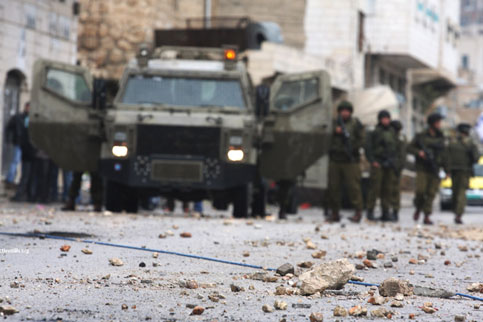 |
| Israel is continuously violating the principles of the 1949 Geneva Conventions that sought to ensure crimes against humanity would never happen again. (Oren Ziv) |
|
Today, the first session of the Russell Tribunal on Palestine (RTP)
will be held in Barcelona. The RTP is a peoples' tribunal focusing not
on Israel's obligations under international humanitarian law (IHL) such
as the Fourth Geneva Convention, but on the obligations of the
international community of signatory states which sustain and enable
Israel's continuous violations of international law.
Israel has
violated more than 60 UN resolutions and countless legal and diplomatic
calls to abide by international law in relation to the expansion of
illegal settlements, denial of the right of return and the continuing
occupation of the West Bank, including East Jerusalem, the Gaza Strip
and the Syrian Golan Heights. Dozens of reports, investigations and
inquiries have produced evidence of alleged Israeli war crimes and
crimes against humanity, including massacres, collective punishment,
home demolitions and extrajudicial killings on a cyclical scale over
the past 62 years.
In 2004, the International Court of Justice
(ICJ) issued an advisory opinion finding Israel's wall in the West Bank
illegal and contrary to international law. The opinion was the key
tenet of a 54-page document covering illegal settlements, the
appropriation of natural resources and Israel's violation of the Fourth
Geneva Convention over the past 40 years, and reminded that IHL
signatory states had an obligation "not to recognize the illegal
situation resulting from the construction of the wall and not to render
aid or assistance in maintaining the situation created by such
construction" and "to ensure compliance by Israel with international
humanitarian law as embodied in that Convention."
The ruling
sparked hopes in the Palestinian community and international solidarity
movements that finally, not only had Israeli violations been legally
judged but that the responsibilities of the states which enable Israeli
impunity to continue would be put to the test. Six years and 500
kilometers of wall on, the continued construction of the wall casts a
shadow over international law.
Or does it?
The RTP is an
independent initiative which intends to generate a public literacy in
international law and the possibilities for the rule of law if
respected to dismantle and disempower the reproduction of the
occupation as a military, cultural and economic movement.
Israel
is an international entity, kept afloat not just financially and
politically by international state partners and supporters, but
"legally" by the continued legitimization of illegal acts and "facts on
the ground" by these states. Israel's most important market is not
economic or military -- it is the market of legitimacy, the permission
it receives to normalize crimes against humanity to its own citizens
and the international community. This can only happen with the
complicity of non-IHL compliant states. The RTP is a way of publicly
pointing the finger at these states and mobilizing public opinion
towards holding them accountable for the ongoing human rights
violations in Palestine.
The RTP is composed of four sessions.
The first in Barcelona from 1-3 March, focuses on establishing whether
the European Union as an entity has fulfilled its obligations under
international law. At the end of 2010, a London session will scrutinize
the complicity of corporations in normalizing and perpetuating Israel's
violations of international law as well as labor rights in
Palestine/Israel. In mid-2011, a session in South Africa will examine
the applicability of the crime of apartheid in the context of Israel.
The final session will be held in the United States in late 2011 and
will analyze the role of the US within the United Nations and
decision-making processes on issues of violating international law.
The
RTP is not a talking shop. For too long Israel has been the focus of
international campaigning as if it alone is responsible for the
oppression of the Palestinian people, and as if it has been acting
alone. The RTP is about making the links between the crimes committed
on the ground in Palestine and their international sponsors. If we want
to popularize the notion of "normalization" of the occupation as a key
obstacle to a just peace, then understanding how this "normalization"
operates on an international legal level in the corridors of
Washington, Brussels and London, as well as Tel Aviv, is a vital part
of challenging it.
As Israeli think tanks and lobby groups bemoan
the rise of "delegitimization" of Israel on a popular level within
Europe, the actual, pragmatic delegitimization of Israeli criminal
policies is still unrealized and unimplemented by countries that have
not just the means but the obligations to do this. The RTP contributes
to the growing movement for boycott, divestment and sanctions by
popularizing the facts behind the arguments for why states have a
responsibility to implement sanctions against Israel, and for companies
to withdraw from illegal projects and for the public to boycott Israeli
institutions, goods and the normalization of apartheid.
The
Geneva Conventions were created and agreed upon by the countries of the
world in 1949, under popular pressure, as the legal means to ensure
that crimes against humanity committed around the world during the
Second World War would never happen again. The principles and tenets of
these laws are being violated by Israel continuously. These laws stem
from liberation struggles and sacrifices of movements in the past, and
are on our side, the side of the people. We can use these laws as
guides to build the conditions for genuine justice and universal human
rights, and a world based on solidarity and equality.
- Frank Barat is coordinator of the Russell Tribunal on Palestine (www.russelltribunalonpalestine.com). A live streaming of the session can be viewed here: www.bcnsolidaria.tv/tv/ and a list of jury members as well as experts and witnesses participating in the tribunal is available for download
(PDF). He contributed this article to PalestineChronicle.com. (This
article was first published at The Electronic Intifada, March 1, 2010)
Electronic Intifada

